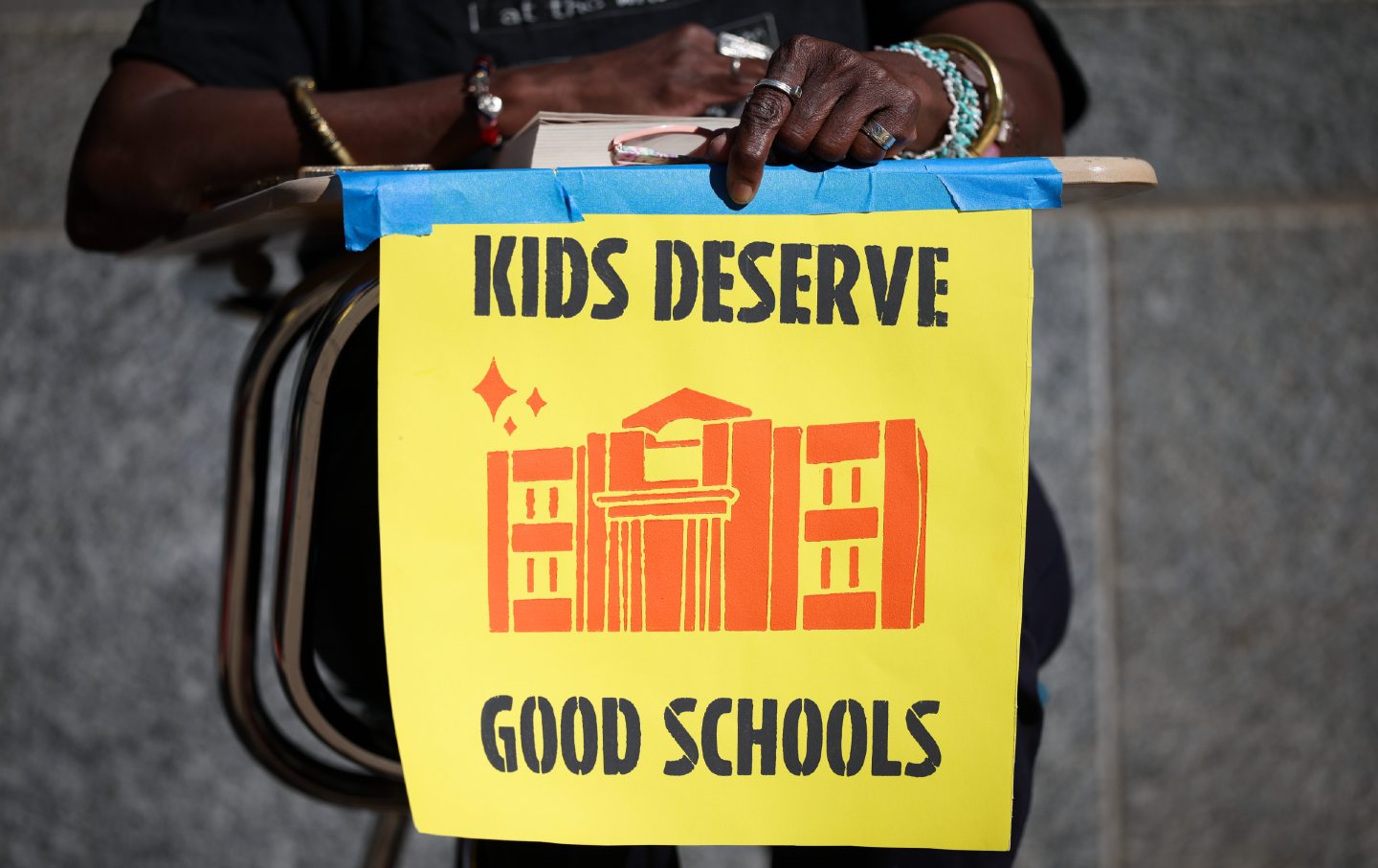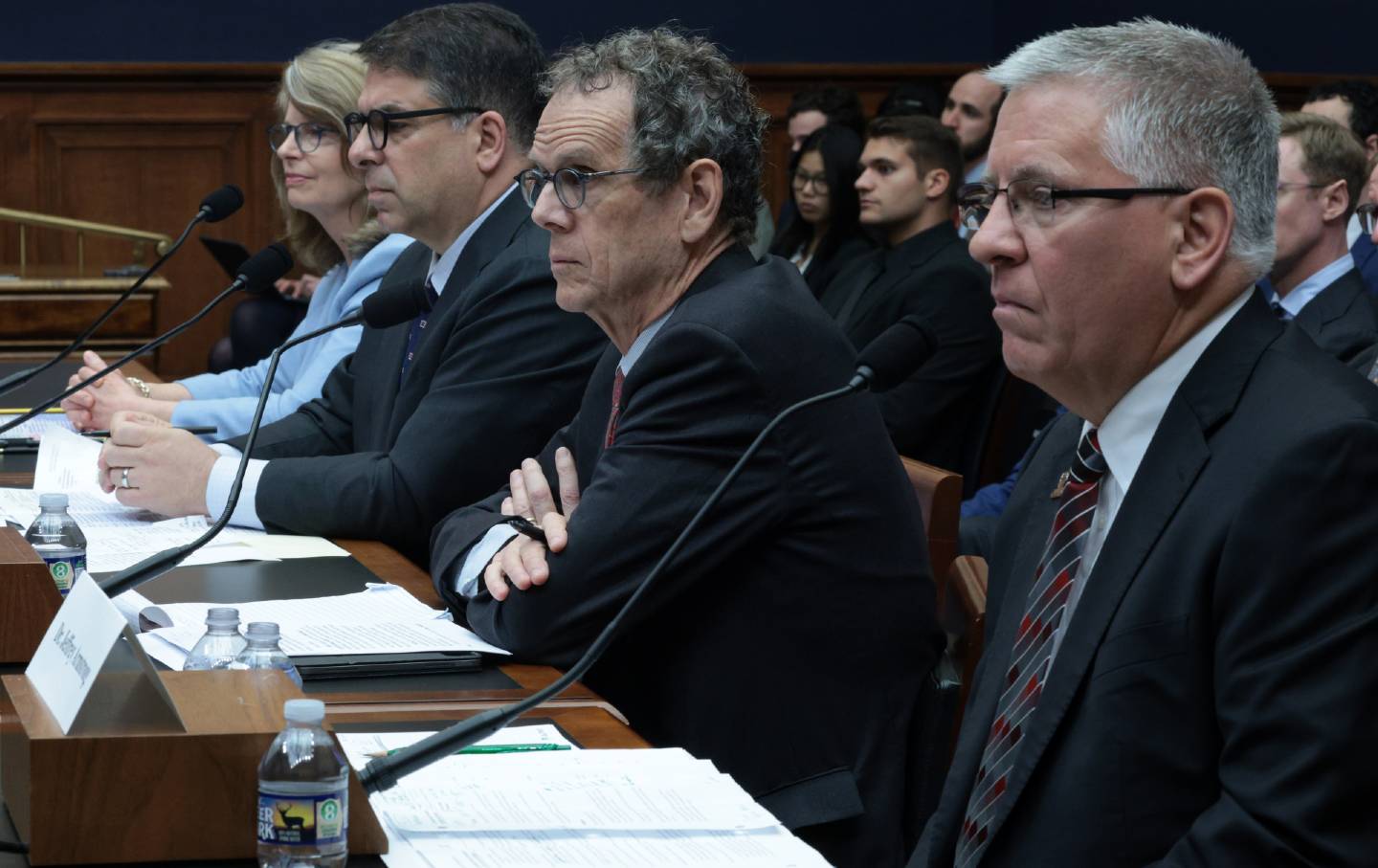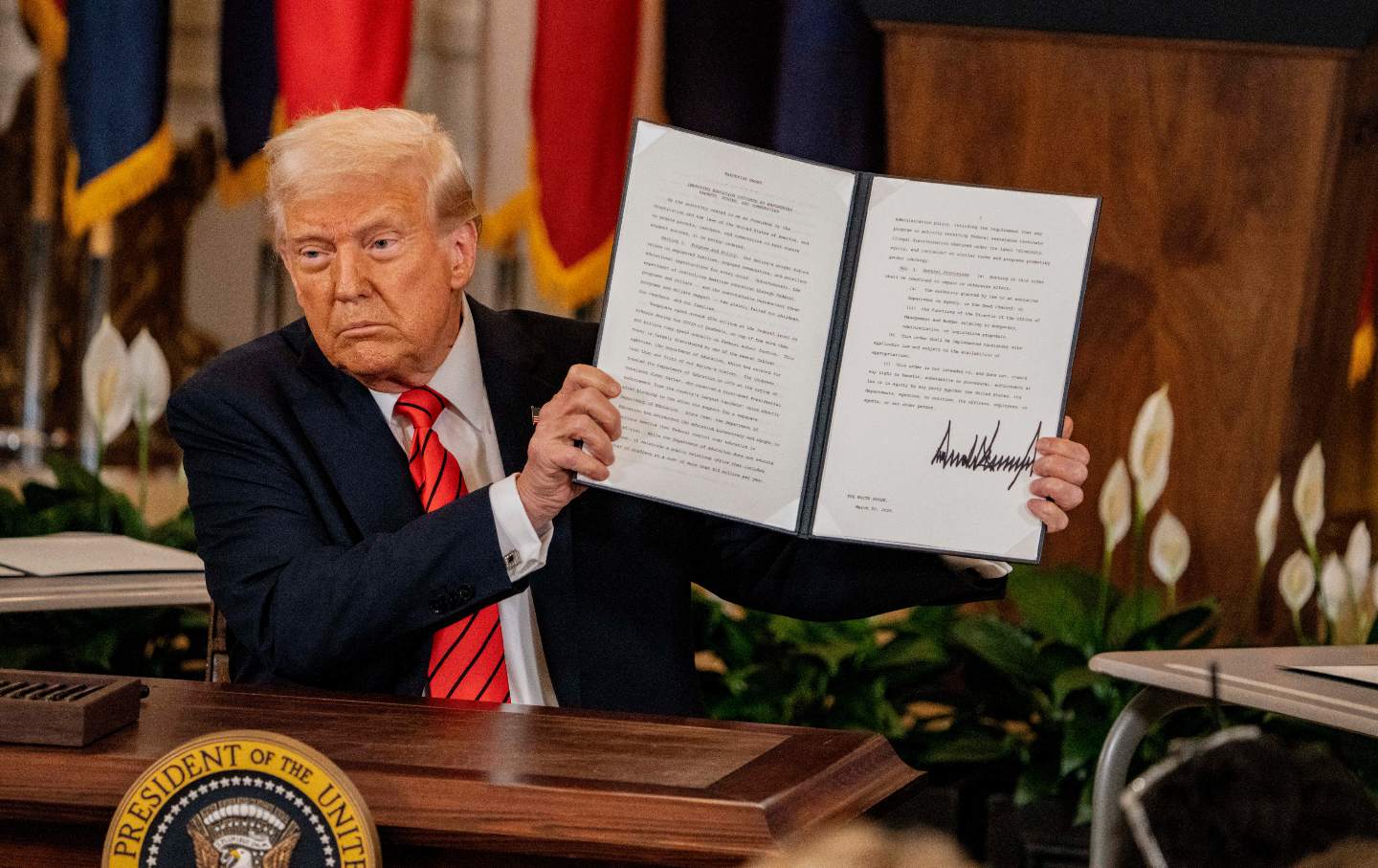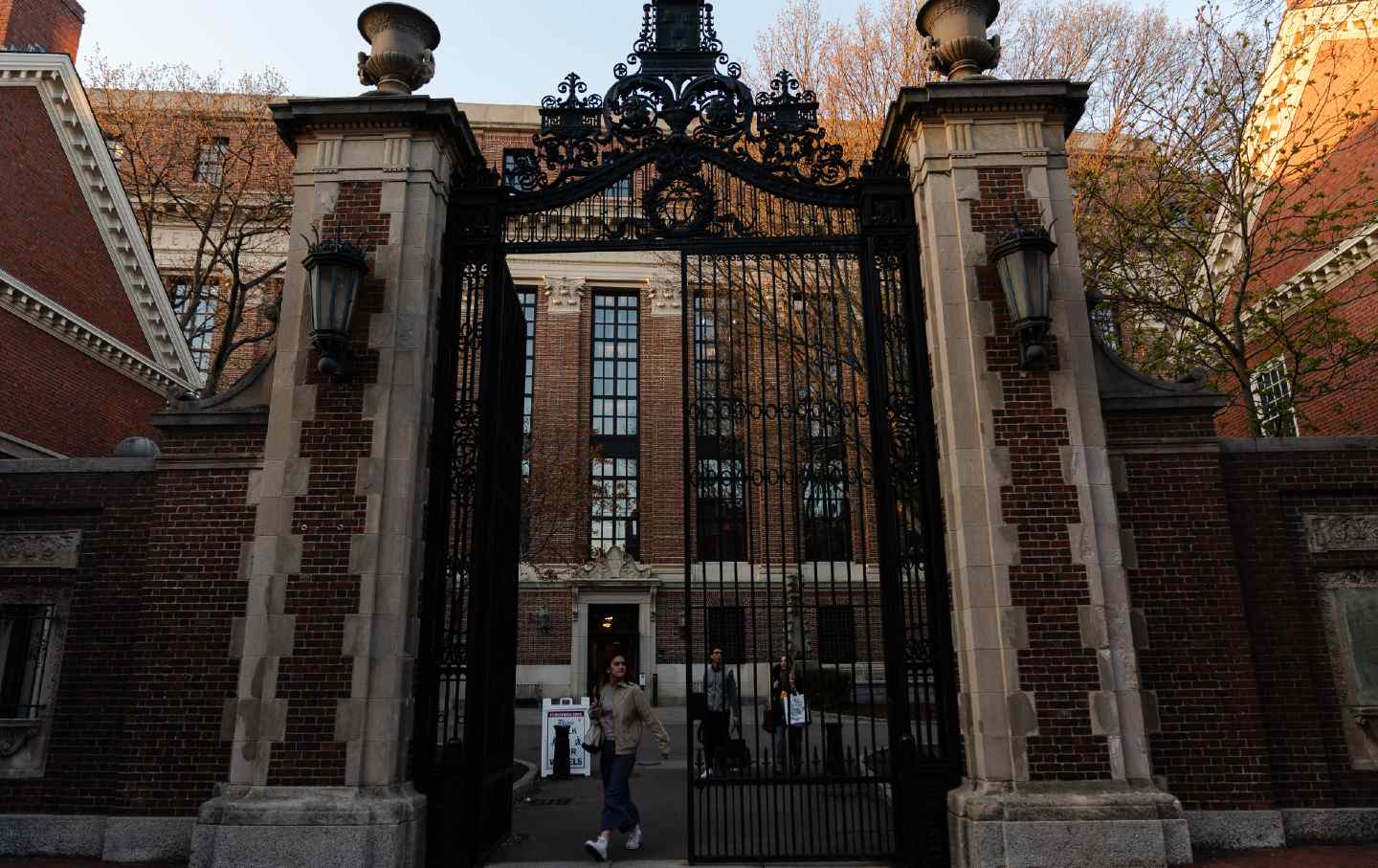“Death Is Different”: Why 2 Men Are Fighting Against Biden’s Commutation
They believe a new sentence of life without parole will hurt their legal chances.
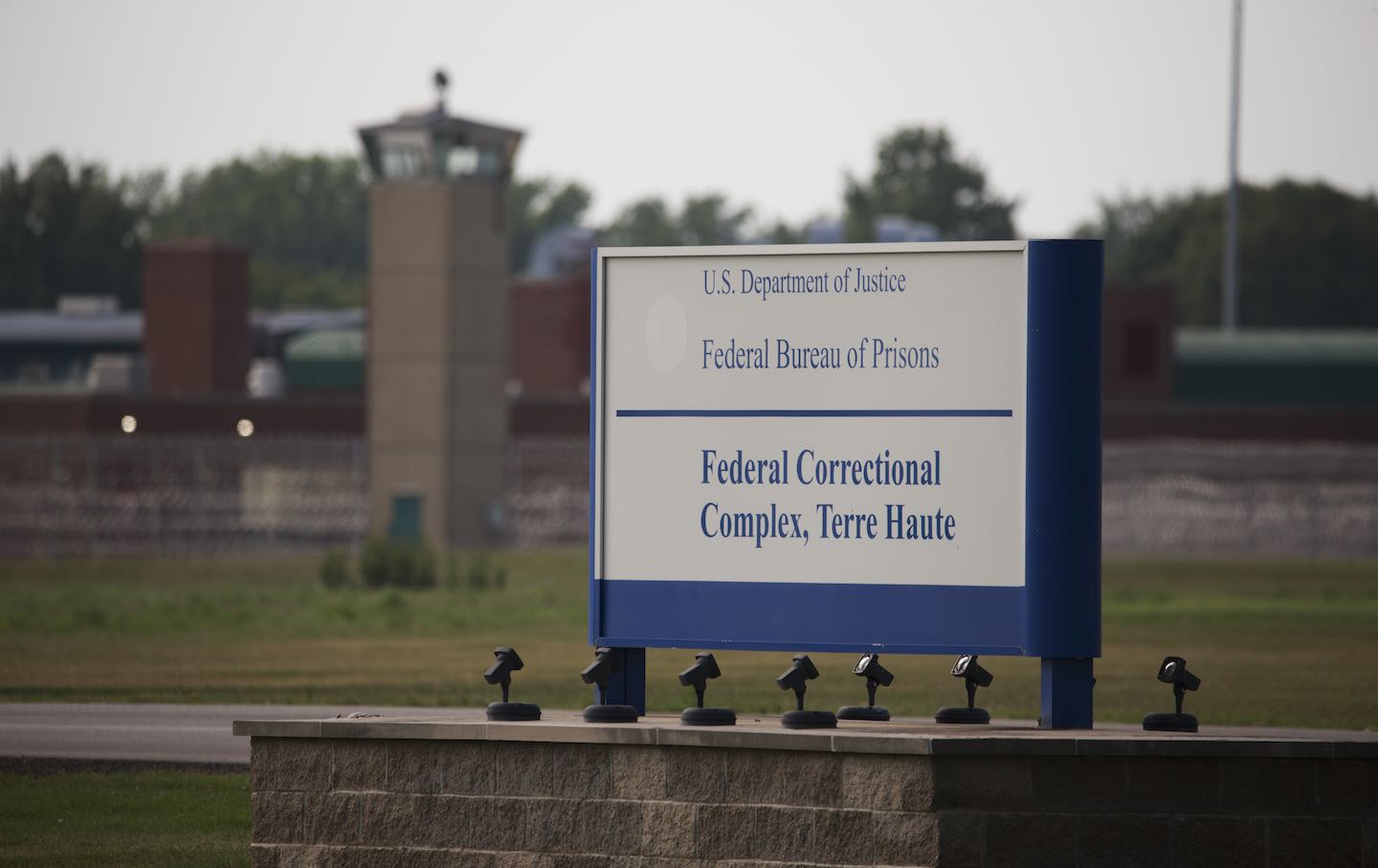
View of a sign outside the Terre Haute Federal Correctional Complex where Shannon Agofsky and Len Davis are pleading with federal courts to allow them to keep their death sentences that President Biden commuted.
(Jeremy Hogan / SOPA Images / LightRocket via Getty Images)
On December 30, two men filed handwritten, emergency petitions from the death row unit in USP Terre Haute, a federal prison in Indiana. Shannon Agofsky and Len Davis were not requesting relief from death row. Instead, they were pleading with federal courts to allow them to keep their death sentences.
Agofsky’s and Davis’s motions came one week after President Joe Biden commuted 37 of the 40 federal death sentences, resentencing everyone to life in prison without the possibility of parole. “The defendant never requested commutation,” wrote Agofsky in his petition. “The defendant never filed for commutation. The defendant does not want commutation, and refused to sign the papers offered with the commutation.”
The commutations elicited a different reaction from other recipients. Rejon Taylor told Newsweek he felt “overjoyed and grateful,” and was motivated to make the most of the act of mercy and “contribute to the betterment of society and prisons.” Similarly, Biden has been celebrated by civil rights groups for stepping away from a barbaric system of state-sponsored murder. But Agofsky’s and Davis’s responses to the commutations should force us to take another look at what these executive actions actually mean to the people receiving them.
Although Americans are split on the issue, public support for the death penalty has slowly decreased since the 1990s. The sentence has been abolished or halted in many states. Each year from 1981 to 1999, at least 250 people were sentenced to death across the country; in 2023, the sentence was handed down just 21 times.
But another sentence has risen in its place, which some incarcerated people and advocates argue is just as severe and inhumane. Nationwide, 56,245 people are serving life without parole (often shortened to LWOP), according to a January report from the Sentencing Project. This marks a 63 percent increase since 2003, and a 352 percent increase since 1992.
Importantly, people sentenced to LWOP—including Biden’s commutation recipients—will never have the chance to appear before a parole board or demonstrate that they have changed. No matter how much time passes, or how old or infirm they become, or what they do to redeem themselves, they are virtually guaranteed to die behind bars, prompting advocates to call the sentence “death by incarceration.”
Agofsky and Davis pushed back against Biden’s commutation exactly because they are concerned such an action will make it harder to have their convictions overturned or reexamined.
Since 1932, the Supreme Court has required greater due process protections for death penalty cases, holding that “death is different.” In 1976, the court ruled that the death penalty cannot be applied in an “arbitrary or capricious” manner, and that these cases must be held to a higher level of scrutiny. Once convicted and sentenced, people on death row have more access to legal representation, and additional opportunities to appeal their conviction and file for post-conviction review.
Since the court does not specify exactly what this heightened scrutiny must look like, some legal experts argue the protections amount to nothing but “a veneer of legitimacy and procedural caution.” Still, Agofsky and Davis fear joining the tens of thousands of people serving LWOP, stripped of these few court-mandated protections.
“To commute his sentence now, while the defendant has active litigation in court, is to strip him of the protection of heightened scrutiny,” declared Agofsky. He argues that the commutation would leave him “in a position of fundamental unfairness, which would decimate his pending appellate procedure.”
Agofsky was sentenced to death for the 2001 killing of a fellow incarcerated person, while he was already serving a life sentence for a 1989 murder. Davis, then a New Orleans police officer, was convicted of arranging the 1994 murder of a witness who had reported him for police brutality. Both allege their innocence in their original convictions, and Agofsky asserts that his capital trial for the prison killing was unfair. “The defendant has worked tirelessly to prove the actual circumstances of his cases, as well as to establish his innocence in the original case for which he was imprisoned,” Agofsky wrote in his filing.
The federal judge overseeing the cases noted in filings that because the men are no longer on death row, they are not entitled to the legal representation they requested. However, he awarded them counsel on a discretionary basis, noting, “The Court harbors serious doubt that it has any power to block a commutation.… Still, given the novelty of the legal question, the Court prefers to receive counseled briefing on the motion.”
In 2021, the Marshall Project highlighted the lack of legal protections for defendants in non–death penalty cases. Shuranda Williams faced a potential LWOP sentence if convicted of involvement in a 2019 murder, which she denied. Unable to afford her $525,000 bond, she awaited trial for over a year in a county jail in Texas, receiving just one visit and one letter from her court-appointed defender. After reporters began inquiring into her case, Williams was appointed a new attorney, had her bond reduced, and ultimately saw her charges dropped. Had she been facing the death penalty, she would have been entitled to more rigorous defense counsel.
Popular
“swipe left below to view more authors”Swipe →Anti-LWOP advocates also argue that the sentence is administered in a racist, and sometimes arbitrary, manner. Nationwide, more than 55 percent of people serving LWOP are Black—an even higher percentage than on death row.
Black people and other people of color experience bias at every level of the justice system, from policing, to charging, to jury selection, to sentencing. In death penalty cases, there is a well-documented “race-of-victim” effect: Defendants are more likely to be sentenced to death if convicted of murdering a white victim. A 2020 study from the Wilson Center for Science and Justice at Duke Law found a similarly concerning trend in LWOP sentencing: North Carolina counties with more Black homicide victims issue fewer LWOP sentences, a trend that did not hold for counties with more white victims. As the Wilson Center explained in a press release, “This race-of-victim effect is consistent with research on death sentencing patterns: white lives matter in our criminal courts.”
Defendants are also at the mercy of the randomness of state law. Half of those serving LWOP come from just five states: California, Florida, Pennsylvania, Louisiana, and Michigan.
Over the past two decades, there has been movement toward ending or reducing LWOP sentences. A series of Supreme Court cases chipped away at states’ ability to issue the sentences to children, ultimately leading to the resentencing of more than 2,500 people across the country and the release of more than 1,000, many of whom had already served decades behind bars.
Other advocacy seeks to ban LWOP for “emerging adults” under the age of 25. And in Pennsylvania, a pending court case could end the state’s policy of automatically sentencing people to LWOP for second-degree murder convictions—even in cases where the defendant did not pull the trigger or intend for anyone to die.
The Sentencing Project recommends capping sentences at 20 years for adults, with rare exceptions. Since recidivism rates are shown to drop significantly as people age, the organization argues that extremely long sentences are an unnecessary deterrent. (Today, about half of people serving LWOP are over 50, and a quarter are older than 60.) This would put the United States more in line with the rest of the world. The United States contains about 4 percent of the world’s population, yet holds 20 percent of incarcerated people, and 83 percent of people serving life without parole.
Biden’s 37 death row commutations aimed to prevent a repeat of Donald Trump’s first term, in which 13 people were executed, more than under any president in 100 years. Biden also commuted the sentences of nearly 1,500 people serving long federal sentences who have successfully been on home confinement since the Covid pandemic, and on Friday announced that he would commute another 2,500 sentences of people serving sentences for nonviolent drug offenses.
In Agofsky and Davis’s cases, the US Attorney’s Office added filings on Monday, urging the court not to block the commutations. The attorney noted: “A prisoner’s consent is not necessary when the President unconditionally commutes a federal death sentence to a life sentence.” And on Thursday, an appointed attorney from the Indiana Federal Community Defenders filed responses in both cases, outlining her clients’ arguments, but ultimately agreeing that their claims lack merit.
In Agofsky’s filing, she explained: “After careful consideration of Mr. Agofsky’s claims, undersigned counsel has concluded that, as the Court hypothesized, the Court does not have any power to block President Biden’s commutation of Mr. Agofsky’s death sentence.”

